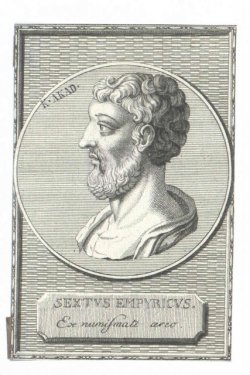
Scepticism is an important philosophical tradition that emerged in Greece during the 4th century BC, and later spread throughout the Hellenistic world. It was founded by Pyrrho of Elis (c.360 – 270 BC), a Greek philosopher who reportedly accompanied Alexander the Great on his travels through the Persian Empire and India. It was during the course of this military expedition that Pyrrho was said to have encountered some “naked wise men” (possibly early Buddhists) whose teachings inspired him to found a new philosophy.
The goal of Pyrrho’s new school of thought was to achieve a state of tranquillity by suspending judgement over all matters. By neither accepting or rejecting any proposition, nor holding onto any firm opinions on any subject, Pyrrho believed that he could escape the troubling contradictions of the world and avoid mental anxiety.
In the centuries after Pyrrho’s death, various schools of scepticism emerged that questioned the possibility of attaining knowledge about reality. Philosophers that subscribed to this sceptic tradition spent their time critiquing and pointing out the shortcomings of different philosophical doctrines and their various knowledge claims.
To this day, the sceptic tradition plays an important role in Western intellectual thought by forcing us to re-examine our commonly held assumptions and beliefs about what is true.
Pyrrho wrote nothing down and so most of what we know about him today comes from fragments of the writings of one his followers, Timon (circa 320 – 235 BC). However, by far the best and most comprehensive account of Pyrrhonian scepticism was written by a philosopher who lived more than 400 years after Pyrrho’s death:

Sextus Empiricus (circa 2nd century AD) was a medical doctor and philosopher who likely lived in Rome, Athens or Alexandria (we do not know exactly where). He was called “Empiricus” because there were three main schools of medicine at the time – the Rationalists, the Empiricists and the Methodists – and he belonged to the Empirical school. He followed the sceptic tradition set by Pyrrho, and throughout his life entered into intellectual combat with anyone who confidently claimed to possess knowledge about a given subject.
While Sextus Empiricus’ medical writings did not survive, his philosophical work, Outlines of Pyrrhonism, has become an important source of sceptic philosophy. It provides a complete description of Pyrrhonian scepticism – its origins, its aims, its underlying motivations – and details at length the modes of argumentation that a sceptic can deploy. He also examines the relationship between the “sceptic way” and the other rival philosophical doctrines of the time.
Outlines of Pyrrhonism had a profound effect on many important philosophers centuries later, providing them with a valuable source of ideas and modes of argument. But perhaps its most important legacy was to alert future philosophers to the dangers of dogmatic thinking. In Sextus Empiricus’ own words:
“Skepticism relieved two terrible diseases that afflicted mankind: anxiety and dogmatism.”
Other important ancient sceptics include Arcesilaus, Carneades and Aenesidemus. Arcesilaus and Carneades wrote nothing, preferring instead to engage in verbal argument, inspired by the philosopher Socrates. Aenesidemus’ written work did not survive, but his thoughts have been briefly summarised by Photius – a learned man who lived in medieval times who wrote many extracts and abridgements of classical works that are lost to us today.
Further Reading
If you are interested in learning more about the different schools of sceptic thought, we would recommend the book Ancient Scepticism by Harald Thorsrud. Further video resources are also available on our Mind Attic YouTube channel playlist.

